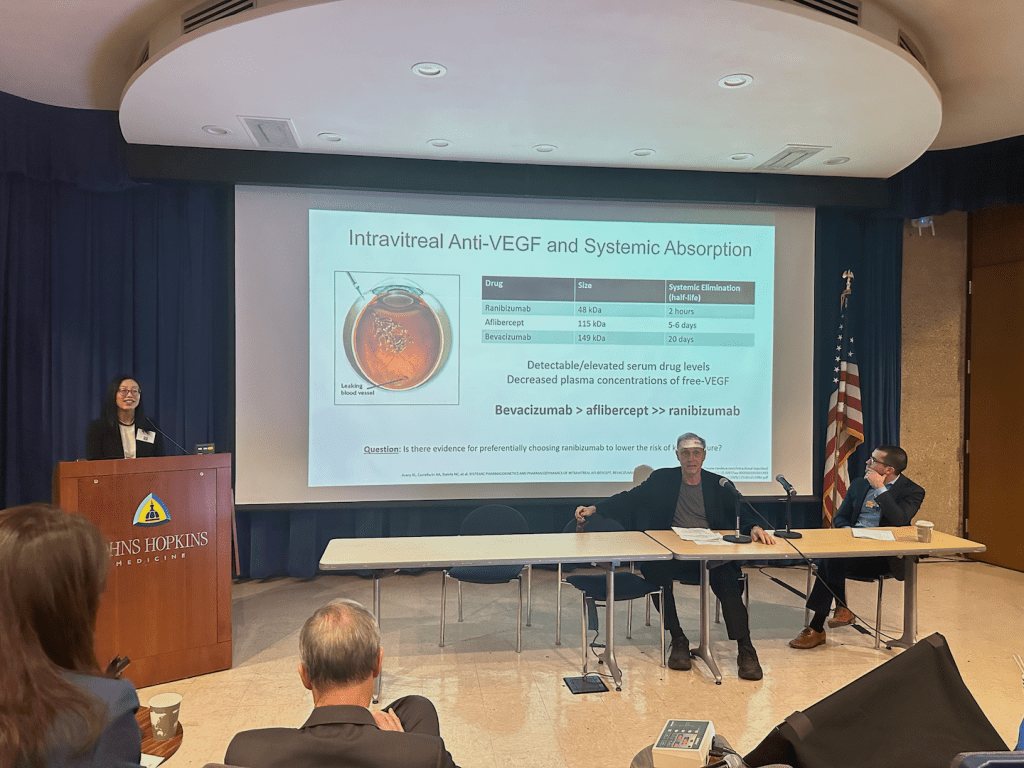Mary (Molly) Munsell
Mass Eye & Ear
Special Topics in Retina for 2025
In the last session of MACULA 2025, Drs. Lee Jampol and Dr. Joseph Anaya moderated presentations on Special Topics in Retina.
Big Data and Social Determinants of Health in Retinal Diseases
Dr. Cindy Cai provided insight on the use of big data in retina research, particularly research related to social determinants of health. She discussed the benefits and limitations of distributed data networks like the Observational Health Data Sciences and Informatics (OHDSI) community for sharing and analyzing outcomes data internationally. She presented the results of two interesting recent studies: 1) there was no increased risk of ranibizumab compared to other anti-VEGF agents with respect to risk for kidney failure, and 2) higher scores on a social determinants of health variable, reflecting factors like insurance status and food security, were associated with lower utilization of eye care.

New Agents for nAMD: Just Durable or More Durable
Dr. Susan Bressler presented on durability versus superiority of novel agents in the treatment of neovascular AMD. She highlighted features of the study treatment protocols in TENAYA and LUCERNE as well as PULSAR which she argued may not necessarily reflect real-world treat and extend protocols, and which would tend to highlight the durability of faricimab and aflibercept 8mg, respectively, over aflibercept 2mg. She called for systematic head-to-head comparison of faricimab and aflibercept 8mg with protocols that allow for greater individual practitioner discretion.
![]()
Therapies for Central Serous Chorioretinopathy
Dr. Jay Chhablani spoke on challenges in classifying and treating central serous chorioretinopathy (CSCR). He presented his group’s recent studies showing very poor inter-rater agreement on the severity of CSCR and proposing an alternative classification model based on multimodal imaging. He critiqued wide variability among past RCTs in the definitions of acute and chronic disease as well as the use of BCVA as an outcome. He highlighted highly varied recently published options including faricimab, topical fluorometholone, brachytherapy, and even medical marijuana. He concluded by sharing plans for an upcoming natural history study in CSCR through the DCRC network. The audience shared skepticism about the efficacy of marijuana in this setting.
![]()
Panel Discussion: Women in Retina in 2025
Also during this final session, Dr. Jennifer Lim moderated a panel discussion on Women in Retina, featuring Drs. Susan Bressler, Adrienne Scott, and Jasmine Francis. Dr. Lim asked insightful questions about ongoing pipeline problems: women constitute nearly 50% of ophthalmology residents and about 35% of academic ophthalmologists, but remain underrepresented in leadership roles. Dr. Bressler highlighted the vast strides women have made in medicine and ophthalmology while emphasizing that there is further progress to be made on many fronts. Dr. Scott validated the challenges women face in having few role models who look like them, but advised young women in retina to continue to blaze trails by pursuing their clinical and academic interests. Drs. Francis and Bressler shared interesting comments on the differences in the roles sought out by female ophthalmologists, the value of career opportunities outside of traditional ladders like department chairship, and the benefits and limitations of designated organizations like Women in Ophthalmology in promoting mentorship for and between women.
Read All Atlantic Coast Retina Club / Macula 2025 Articles:
Mystery Cases 1 & 2
Mystery Cases 3 & 4
Mystery Cases 5 & 6
Mystery Cases 7, 8, 9
Imaging, GA, and IRDs
Keynote Lectures
DR and DME
Choroidal Neovascularization
Retinal Vascular Diseases
Ocular Oncology
Special Topics & Women in Retina